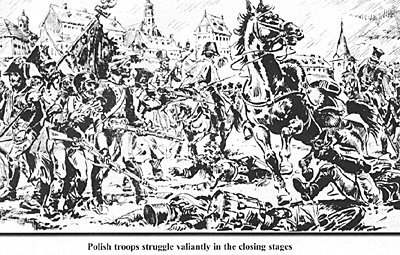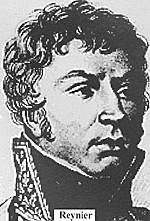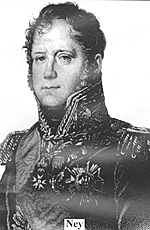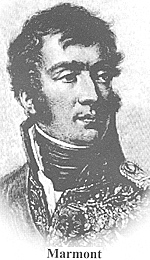The Battles Around Leipzig
October 1813
Latour-Maubourg Falls
by DH Parry
Edited by Gay Gibson
| |
Murat had a narrow escape; twenty-four of the guns were retaken by the Russians, and a grand opportunity was lost, while Gossa later in the day became the scene of a fierce encounter with the light troops of the Russian Guard, who forced the French to retire, and held that place as the allied right; their centre being then at Auenhayn, their left at Mark-Kleberg. At Connenitz, between Doetlitz and Leipzig. Count Meerfeldt had crossed the Pleiss unexpectedly, but Curial with the Chasseurs-a-pied of the Guard, came upon him, routed his battalion and being unhorsed and wounded, the Austrian general gave up his sword to Captain Pleineselve. Darkness fell, and as the clocks chimed six the guns ceased firing, the rattle of small arms died away, and the French remained practically in the same position, while the front of the allies had been considerably narrowed. Nevertheless, Napoleon had gained no real advantage: it was of little consequence that he had maintained his ground. Many men had fallen on both sides, but the allies could afford to lose them, and the French could not. He was hard pressed by Blücher on the north; to southward the enemy were being strongly reinforced, and a hideous stream of wounded crawled back to the city to show how severely the Grand Army had suffered. The corn magazine, capable of holding 2,500 men, was crammed full to overflowing, the rest lay about the streets untended, and reflected the greatest discredit on the ambulance arrangements, never adequate to the needs of any of those gory campaigns; while out beyond the city a circle of fires and blazing villages showed where the armies bivouacked among the dead. Sunday came, the 17th October, dark and stormy with gusts of rain; and the allies, hearing that Beningsen and Collorado would not be up before evening, postponed the attack until the following day. But Napoleon, finding that Wintzingerode, with the advance-guard of Bernadotte's army, had worked round to the east of Leipzig and appeared at Taucha on the Partha's banks, and that the net was closing tighter, spent the hours in anxious meditation, and made fresh plans to concentrate his forces closer round the city. He pitched his five blue and white-striped tents in a dry fish-pond near Probsteyda that night, with the Old Guard encamped about him, and waited in vain for a reply to his negotiations, having sent General Meerfeldt, on his parole, to the allied sovereigns with certain proposals. “They are deceived in respect to me,” he had said to that officer. “I demand nothing better than to repose myself in the shade of peace, and unsure the happiness of France, as I have ensured her glory”; but the sovereigns were no longer to be hoodwinked by specious words: with time had come experience. Down a long vista of one hundred and ninety eighty years we can now look back calmly, if with wonder, at this stirring period; feeling almost a reverence for the little figure on the white horse, as we marvel at his mighty genius, and gaze with admiration at the faded flag he kissed at Fontainbleau, or the motheaten chapeau he wore at Eylau; but set the clock back, and picture how he looked in 1813. Napoleon had become a public nuisance in Europe: no king was safe on his throne, no people within his reach knew at what hour the tap of the drum might not sound on the high road and a locust scourge spread over their fields. No Sleep During the night Napoleon knew no sleep; Nansouty and various generals were called up to be questioned, and at 3 o'clock in the morning the four lamps of the emperor's carriage flashed outside Ney's quarters at Reudnitz -- the same that Napoleon had occupied on his arrival. After an hour of close consultation the emperor left in the rain, and walking with Murat along the swollen dykes for half an hour, again sought his tent, much absorbed. It is also said they rode along the causeway as far as the Kuhthurm, or Cow Tower, towards Lindenau, to give Bertrand instructions to occupy Weissenfels and keep the road clear. An alteration in the French position had been effected in the night and early morning, and now Connenitz formed the right wing under Prince Poniatowski, raised to the dignity of marshal for his gallantry the day before. Victor had fallen back to Probsteyda; Lauriston, between that village and Stötteritz, upon which latter place Macdonald had retired.
South of Leipzig Murat was in command east and north, Marshal Ney; the emperor himself remaining the greater part of the time on a hill behind Probsteyda, near the ruined windmill and tobacco factory, that gave him a panoramic view of the field, and round about which his guard was waiting. By eight o'clock on the 18th Napoleon was on the windmill hill, and a little later the allied troops were again on the march to attack him. The weather had cleared and the sun was shining; the Prussians began to sing " Hail to thee in victory crowned," their bands joining in; and, from their quarters at the dismantled chateau of Rotha, some ten miles away the Emperor Alexander and his suite rode into the plains at Glossa, joined by Frederick William of Prussia, who had slept at Borna, to witness the commencement of a conflict so fierce that it has been called the “Battle of the Giants” by some, and by others the “Battle of the Nations.” Three columns were in motion: 1st, Beningsen, with Bubna, Klenau, and the Prussians under Zeithen -- 35,000 in all, or thereabouts was to advance by Holzhausen on Murat's left-- helped, it was expected, by Bernadotte's army; 2nd, Barclay de Tolly, with Kleist's Prussians, Wittgenstein's men, and the Russian reserves -- estimated at 45,000 in all -- who was to aim for Wachau and the centre; and, 3rd, the Prince of Hesse-Homburg was to lead 25,000 Austrians down the marshy Pleiss against Dösen and Doetlitz, while Meerfeld's Corps, under General Lederer, went down the left bank of the same stream to renew the attempts against Connenitz which the Old Guard had baffled the day before. At first the columns found little to oppose them: Beningsen cleared the French advanced posts out of Engelsdorf and stayed there, as Bernadotte was not yet in evidence; Zeithen carried Zurkelhausen with much spirit and took some guns, while Klenau drove Macdonald's rearguard from Holzhausen village; but the near presence of Ney and the non-arrival of the Army of the North crippled the action of the 1st column for a time. The 3rd column flung its white battalions on Dösen and Doetlitz, and had a hard fight among the bushes and garden walls. Napoleon stayed for an hour on his right flank to watch the opening struggle; Hesse-Homburg was wounded - and Bianchi took command; Kellerman's Horse and old Augereau's men supported Poniatowski with some success, but the Austrians eventually took Connenitz, and there they stayed, unable to do more, and held in check by the firm front of brave Poniatowski, backed by Oudinot with some of the Guard. All day they kept up an incessant skirmishing, and the brown batteries of Austrian artillery on the one side, and the blue batteries of the French on the other, continued to thunder and boom almost without intermission until darkness fell. Somewhere about ten o'clock, or an hour after the battle began, Napoleon left the right flank and galloped away to Probsteyda, a circular village surrounded by villas and gardens, strongly occupied by Victor; and there he found the 2nd column of the enemy, which had passed through Wachau unmolested, preparing for the attack. Probsteyda, and Stötteritz a mile off to the left, were the keys of the French centre, and massing Lauriston's men between the two, rather in the rear, with the bulk of the Imperial Guard on the windmill hill behind Probsteyda, Napoleon turned all his attention to that portion of the field, viewing the conflict from the ruined windmill itself. A furious artillery duel began on both sides -- a duel which was, perhaps, the most prominent feature of the Leipzig battles, for, from dawn till dusk the whole plain resounded with the roar of cannon, and the smoke of 1,600 pieces hung round the city, through which the watchers on the ramparts and steeples could catch hasty glimpses of surging cavalry or the progress of infantry columns rushing to engage. Under cover of the guns three Prussian brigades flung themselves on Probsteyda, met by the fire of Victor's troops, who lined the walls and fired from the attics and windows. Many forgotten scrimmages took place in alleys and pretty gardens; the hedges hid long lines of dead and dying who had fought with desperation in attack and defence; the people in Leipzig questioned the wounded who staggered in through the gates, “How is it going?” and it was always the same reply, “Badly enough; the enemy is very strong!” By two o'clock Prince Augustus and General Pirch had taken half the village, but reprisal was at hand, and the emperor descended at the head of his Guard and led it with loud shouts of victory down the hill, where the bearskins thronged into the streets and hurled the Prussians out again. French horsemen in a dense body rode round the end of the village soon after, but Grand Duke Constantine - he of the lowering brow - moved his troopers forward with a strong support of foot and held them in check, while smoke and flames rolled over Probsteyda, and the horsemen did not charge. Shot and shell tore backwards and forwards, until it seemed little short of miraculous that men could live; battery after battery swept the plain: the officer riding with a vital order, the drummer beating to advance or retire, the surgeon dressing a limb in the shelter of a burning farmhouse - all were hit, death was in the very air itself; yet Murat in sable-trimmed pelisse, galloped hither and thither unhurt, and the emperor himself tore heedlessly through his troops after his usual manner; his suite sometimes riding down an unlucky fantassin or two who did not get out of the way fast enough. All day they fought at Connenitz, at Probsteyda, and round about Stötteritz, without making any headway on either side but to north and east clouds were rolling up in spite of every effort of the heroic Ney to ward them off. After hot skirmishing all morning on the banks of the Partha, Langeron's Russian corps crossed that river at Mockou; and about two o'clock Wintzingerdode’s cavalry passed it, higher up and came into touch with Beningsen whom we left waiting at Engelsdorf.
Reynier, who was under Ney, had been fighting hard for several hours with Bubna, and his difficulties were increased by the presence of the Hetman Platoff, with 6,000 roving Cossacks. Poor Reynier was destined to meet with severe reverses on that day, and also to experience a novelty in warfare, for there trotted up about the same time a little body of horsemen clad in smart blue jackets braided with yellow, with large semicircular crests of black bearskin on their leather helmets. English horse artillery they might have seemed from a distance but for the long bundles of what appeared to be lance shafts which they carried in buckets by their sides. The Rocket BrigadeEnglish they were -- Captain Bogue's troop of the Experimental Rocket Brigade attached to the Swedish army; and soon there came fiery serpents into Reynier's ranks, whizzing and burning and causing great disorder. Bogue was killed by a ball in the head, and Lieutenant Strangways took command - the same man who, as General Strangways, said gently, “Will someone kindly lift me from my horse?” when a cannon shot tore off his leg at Inkerman in 1854. Often enough those rockets went the wrong way, and caused consternation among the troop itself; but it is certain that they astonished the French tremendously, and not long after eleven Saxon battalions, three squadrons of cavalry, and three batteries of guns stalked over from Mockou in the heat of action, and deliberately joined Bubna, leaving Reynier to his fate. The French Cuirassiers understanding too late what was happening, charged after them, but the traitorous artillery slewed round and fired on their late comrades, the rest of the Saxon brigade marching into bivouac a league behind the allies.
Twice during the morning had Ney sent to Reudnitz for a fresh horse and again for a third in the afternoon. Several times Langeron assaulted Schoenfeld without success, but at last he took it; and Büllow carried Paunsdorf later in the evening. Ney fell back on his quarters at Reudnitz, wounded by a ball in the shoulder, Sacken having pressed Marshal Marmont hotly in the suburbs of Leipzig itself, and Blücher having been driven out of Reudnitz by Napoleon in person. Darkness was approaching, and with it came the rain. The guns continued after that, and, as on the previous night, a circle of conflagration once more surrounded the city, thirteen villages and farms being in a blaze, and a multitude of bivouacs glowing wherever the eye rested. A fire was kindled near the ruined mill, and Napoleon dismounted beside it with a heavy heart. The Battles Around Leipzig October 1813
Opening Manoeuvres The Action Opens Latour-Maubourg Falls Decision to Evacuate The Escape Route and Poniatowski The Bridge Explodes Large Map of Leipzig Area (slow: 97K) Back to Table of Contents -- First Empire # 74 Back to First Empire List of Issues Back to MagWeb Master Magazine List © Copyright 2004 by First Empire. This article appears in MagWeb.com (Magazine Web) on the Internet World Wide Web. Other articles from military history and related magazines are available at http://www.magweb.com |
 Latour-Maubourg had his leg taken off at the thigh by a ball, and brave Pajol met with a terrible experience. A shell entered the breast of his horse, burst inside, and flung the general many feet in the air, breaking his left arm and several ribs as he fell, to be rescued with great difficulty by his aide-de-camp, Lieutenant-Colonel Biot, and some staff officers.
Latour-Maubourg had his leg taken off at the thigh by a ball, and brave Pajol met with a terrible experience. A shell entered the breast of his horse, burst inside, and flung the general many feet in the air, breaking his left arm and several ribs as he fell, to be rescued with great difficulty by his aide-de-camp, Lieutenant-Colonel Biot, and some staff officers.
 General Reynier with a brigade of Saxons occupied Mockou, and also Paunsdorf, on the Wurtzen-Dresden road; Ney was in force near Setterhausen, not far from Reudnitz, and at Schoenfeld on the Partha; while the northern suburbs of Leipzig were defended by Marmont as before. Thus, with Bertrand on the west, the city was completely surrounded, the position having one great fault, as Napoleon well knew -- namely, in case of defeat all these scattered corps, miniature armies in themselves, would be forced to get away by the narrow causeway across the Pleiss and Elster.
General Reynier with a brigade of Saxons occupied Mockou, and also Paunsdorf, on the Wurtzen-Dresden road; Ney was in force near Setterhausen, not far from Reudnitz, and at Schoenfeld on the Partha; while the northern suburbs of Leipzig were defended by Marmont as before. Thus, with Bertrand on the west, the city was completely surrounded, the position having one great fault, as Napoleon well knew -- namely, in case of defeat all these scattered corps, miniature armies in themselves, would be forced to get away by the narrow causeway across the Pleiss and Elster.
 Ney accordingly concentrated his forces between Schoenfeld and Setterhausen to oppose the approach of the Army of the North, which began to appear at Taucha.
Ney accordingly concentrated his forces between Schoenfeld and Setterhausen to oppose the approach of the Army of the North, which began to appear at Taucha.
 This serious defection caused Napoleon to send a strong force to Reynier's assistance; but all it could do was to rescue the remnant of that general’s corps, and the desertion remains a standing disgrace to Saxon honour for all time.
This serious defection caused Napoleon to send a strong force to Reynier's assistance; but all it could do was to rescue the remnant of that general’s corps, and the desertion remains a standing disgrace to Saxon honour for all time.